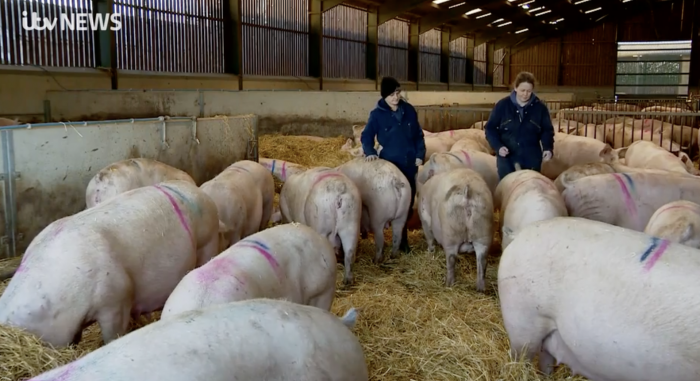Yorkshire pig farmers and industry campaigners, the Morgan sisters, have called for more action from the supply chain and Government to help save the British pig industry.
The industry continues to be ravaged by multiple problems, including a pig backlog, estimated to have reached around 150,000 pigs, ongoing culling of pigs on farm, soaring feed costs and falling pig prices, leaving many producers considering their future in the industry.
ITV Calendar News covered the story this week, visiting Kate and Vicky Morgans’ overstocked pig unit in Yorkshire. The family would normally sell around 90,000 pigs a year, but are 30% down on contracted weekly numbers due to the staff shortages in pork plants and estimate they are losing between £25 to £30 per pig.
“I have just come off the phone to the vet talking about how we go about taking it to the next level and culling on farm,” said Kate. “I think about 10,000 pigs have been culled in Yorkshire – it’s a complete waste. It’s criminal what has happened.
“We’re the ones who are suffering financially and emotionally. The farmers are taking the hit in every way”, said Vicky.
“We are suffering massively through no fault of our own and the government have to be held responsible for that.”
The programme also reported on the move by East Riding of Yorkshire Council to backed a motion calling on the Conservative-run authority to take action to address the ‘severe shortage’ of pork processing plant workers and the pig backlog.
The motion calls for the council to support pig farmers in the area by writing to the Defra Secretary and Prime Minister expressing ‘serious concerns about the future of this industry and demanding urgent action’ to prevent its destruction. It also instructs the Cabinet to see what actions it can take to support local farmers, for example, by using leaflets and social media to encourage processing workers to apply to work here.
NPA senior policy adviser Charlie Dewhirst, who is a Conservative councillor, said the Government’s support package had not worked and farmers are on the verge of being forced out of business.
“If this goes on any longer, we’ll see more and more farms go out of business. That in turn affects all the indirect business that support farms here in the East Riding,” he told the programme.
“It’s a hugely important part of our rural economy and ultimately we won’t have an industry left in the UK.”




